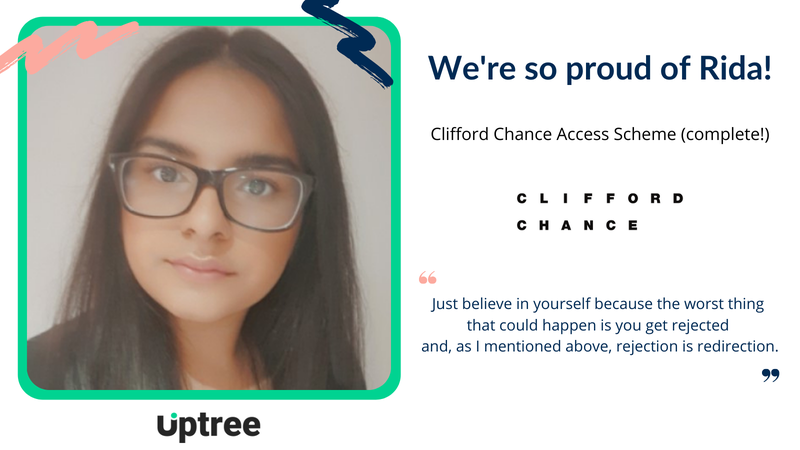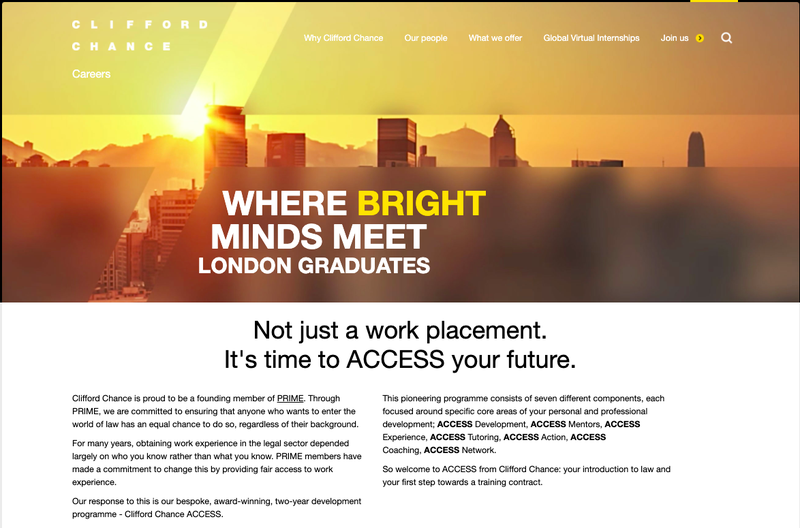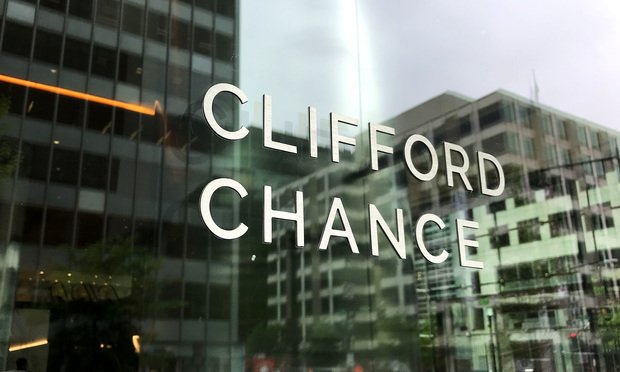
Student Success Story: 'Rejection is redirection' - pursuing a career in Law
My name is Rida and I’m from Leicester. I have just completed my A-levels in Law, Sociology and English Literature and I am hoping to begin my Law degree this September.
Throughout the past two years, I have had the opportunity to take part in some amazing work experience schemes including the Clifford Chance ACCESS Scheme.

When did you join Uptree, how did you hear about us and what events did you go to?
I joined Uptree over a year ago, after hearing about them on Instagram and LinkedIn. At the time, I was looking for work experience opportunities and realised that Uptree holds numerous events in a variety of sectors. I went on to take part in the FuturesUP Festival and the J.P. Morgan Technology work experience day.
How did Uptree help you get onto the ACCESS Scheme?
One of the places where I first heard of the Clifford Chance ACCESS Scheme was on the ‘opportunities’ section on the Uptree website.

I used the company’s section to learn more about the firm which was really helpful. Something I really found useful is the Uptree Instagram takeovers done by ambassadors as - by watching them - I gained some incredibly useful tips that I was later able to apply to my life and my work experience applications.
What made you decide to take on this role?
I decided to apply for the Clifford Chance ACCESS scheme because I found the idea of being a commercial solicitor really interesting after taking part in a work experience at an international law firm earlier in the year. I also wanted to gain more work experience in the legal sector.
The ACCESS scheme is very detailed and really provides you with everything you need to make successful graduate job applications.
I felt like I could gain a lot from it and, throughout the scheme, I could really see how much effort the graduate recruitment team had put into making it as helpful as possible.
Tell us about how you found the programme
The Clifford Chance ACCESS scheme consists of 7 elements. The first is a 4 day work experience at the firm where you learn more about the legal sector, career paths and transferable skills (ACCESS Development).
The other elements I experienced were:
- Mentoring with a place on the Social Mobility Business Partnership (SMBP) scheme
- A-level tutoring
- The chance to work with a domestic abuse charity
- Coaching with Rare Recruitment
- Networking opportunities
So far, I have completed the work experience with the firm, have been given access on the mentoring platform, begun the coaching and have just been offered a place on the SMBP scheme for August 2021.
It has been incredibly helpful as I’ve developed so many skills that are necessary to for any career, not just law, and have had the chance to meet amazing people.
Also, I got the opportunity to become an ACCESS Ambassador to promote the scheme and - through that - I created a 10 minute video with Laura Yeates (Head of graduate talent at Clifford Chance) on application tips and my experience on the scheme.
This experience really did prove to me that I would enjoy a career as a commercial solicitor and has helped me build on the key skills that are necessary to thrive in the legal sector.

Originally, I wasn’t going to apply to the Clifford Chance ACCESS scheme as I thought it was too good to be true and, therefore, quite competitive. I was also really worried about completing the Watson Glaser test. After some encouragement from my mentor - who actually completed the ACCESS scheme (previously known as PRIME) and went on to gain a place on the Clifford Chance SPARK scheme (getting a training contract with the firm after that) - I decided to just apply.
I really put everything I could into the application; drawing on my knowledge from past experiences and the research I had done on the firm to answer the 2 questions that required longer answers.
I was really happy with my answers and got great feedback on it from others that read it, but I was more worried about the Watson Glaser test as it was something I had never done before. I practised before taking the test and did manage to get on the ACCESS scheme.
However, after enquiring about my score, I realised I didn’t really do well on the test. So, I decided to keep on practicing as despite getting onto the scheme, I would still need to do the Watson Glaser test in the future.
What I do know is that I tried my best in those applications and that’s all that matters.
If I know that I couldn’t have made my application any better than I know that I will not be constantly thinking of ‘what ifs’ which is what really ends up making you overthink everything. Something I learnt from a study youtuber is that ‘rejection is redirection’ which is very true as when one door closes another opens.
All I try to do is learn from my mistakes so that I do not repeat them again which has worked really well for me as I’ve been given amazing opportunities.Another thing would be to ask for help from people who may know more than you and, for that, I’d recommend using LinkedIn as a lot of people are really nice and happy to help.
Overall, rejections are disappointing but it’s what you learn from that situation that matters.
Do you have any advice for students also interested law?
I have 3 key pieces of advice that I’d share to students in sixth form.
- The first is to research the opportunities available to you as there are a huge amount, but they just require you to look for them.
Really explore what’s available to you, in a variety of different careers, as my theory is that you cannot rule out a career unless you have tried it or researched it.
- My next piece of advice is to use LinkedIn. It’s a great way to meet like-minded people or those with more experience who have plenty of knowledge to share.
Send a personalised connection invite (very important) and if they don’t reply, that’s fine but if they do, you can gain so much.
- My last piece of advice is to just apply. Try not to overthink it and just apply for whatever it is: a university you are not sure you’ll get into; a scholarship; a competitive work experience or even a part-time job. The worst thing you can do is not apply at all as you definitely will not get in if you don’t apply, but if you do than you at least have a chance.
Just believe in yourself because the worst thing that could happen is you get rejected and, as I mentioned above, rejection is redirection.
If anyone has any questions about the ACCESS Scheme or anything that I mentioned above, feel free to reach out to me on LinkedIn as I could not have gotten to where I am now without a lot of people’s help.
By Uptree
Published on:
Mon 2 Aug 2021